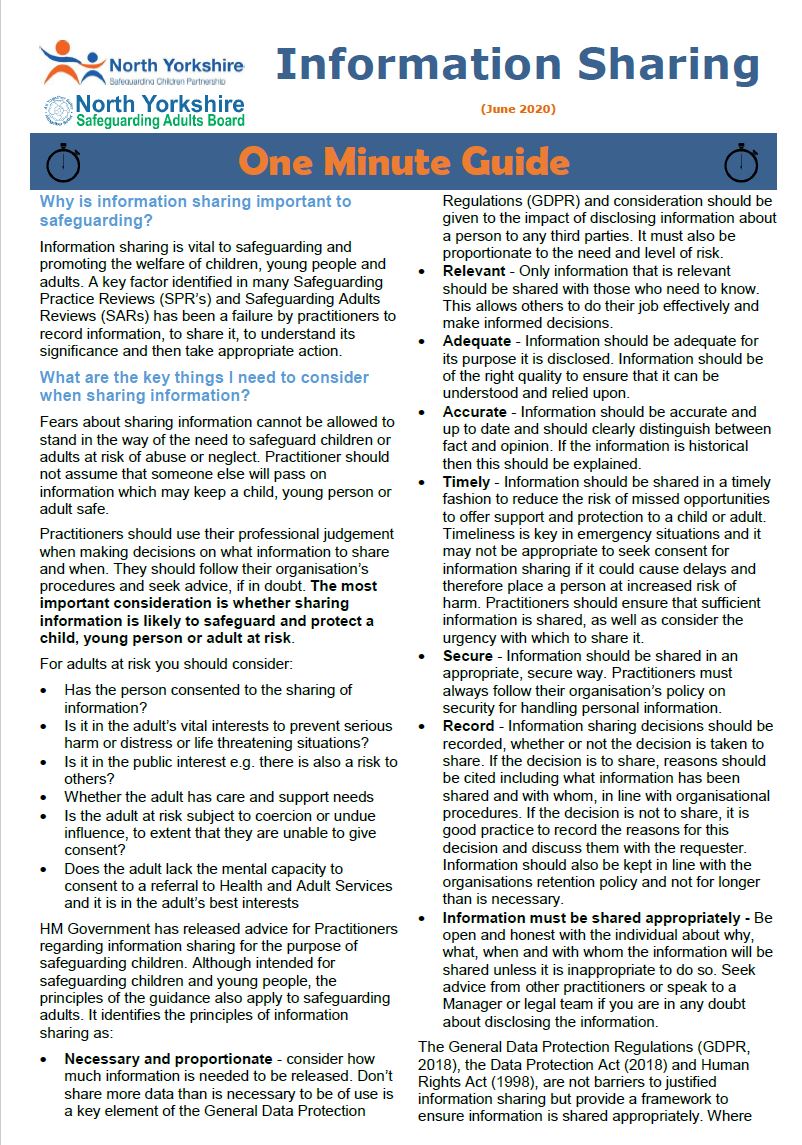Principles for working with children/young people
Confidentiality and sharing information
Everyone is entitled to confidentiality even if they are under the age of 18.
Effective information sharing underpins integrated working and is a vital element of both early intervention and safeguarding. Research and experience have repeatedly shown that keeping children safe from harm requires practitioners to record, analyse and understand the significance of the information they hold.
Fears about sharing information cannot be allowed to stand in the way of the need to safeguard children or adults at risk of abuse or neglect. Practitioner should not assume that someone else will pass on information which may keep a child, young person or adult safe.
Practitioners should use their professional judgement when making decisions on what information to share and when. They should follow their organisation’s procedures and seek advice, if in doubt. The most important consideration is whether sharing information is likely to safeguard and protect a child, young person or adult at risk.
For more information on information sharing see our One Minute Guide:
The decision whether to share the information depends on the degree of current or potential harm, it does not depend on the age of the child/young person. Remember to let the child/young person know your confidentiality procedures and their limits.
Sometimes concerns of significant harm may lead you to make a referral or share information with their GP without consent, however it is highly recommended to seek consent where possible. Seeking consent should not delay any urgent action required. Seek support from your manager for this process.
All professionals working with young people have to be accountable if they decide to share information and break confidentiality by showing that the decision was in the child/young persons’ best interest. If this happens, a child/young person can expect:
- To be told the information is being shared, with whom and why.
- To be kept informed.
- To be offered appropriate support.
Ensure that you record any discussions or actions related to self-harm or suicidal intent in line with your organisational policies.
Competency
In assessing competence you need to ensure that they can understand the information and advice that you are giving them. If a child/young person is judged as not competent and does not understand their situation, you will need to work sensitively as you may have to break their confidence. Inform them of your requirement to do this, how this will be done and what is expected to happen. Your aim is to ensure they are safe and have access to any help which is required.
Role of parents and carers
It is important to consider the supportive role that parents or carers can play in keeping a child/young person safe. This may be a supportive relationship but it is important not to assume so. It is good practice to discuss with the young person whether they wish to tell a parent or carer about how they are feeling. If the young person decides that they do not wish to tell their parent/carer then this must be respected. The only time you should break this confidence is if there is a serious risk of harm to the young person in not doing so.
Child Protection
If you feel that the child/young person is at risk of significant harm you may decide you need to break confidentiality. The Customer Service Centre can be contacted on: 0300 131 2 131, they will require you to inform and/or seek consent for the referral from the young person and their parents unless doing so would put the young person at further risk of harm. The underpinning principle is one of transparency but some children/young people may feel concerned at parents being notified, so explore the underlying reasons for this before you decide whether to proceed. In cases of an abusive home life it may not be in their best interest to inform parents as it may increase risk to the child/young person.
If you are concerned that the child/young person is in need of protection, The Customer Service Centre can be contacted on: 0300 131 2 0131.
Looking after yourself supporting people who self-harm or experience suicidal thoughts is emotionally demanding and requires a high level of communication skills and support. You may experience emotions such as anger, shock, disgust or guilt, so it is important that you have the space and support to reflect on how this impacts on you.
Looking after yourself
Supporting people who self-harm or experience suicidal thoughts is emotionally demanding and requires a high level of communication skills and support. You may experience emotions such as anger, shock, disgust or guilt, so it is important that you have the space and support to reflect on how this impacts on you.
Responsibility to assess risk
It may not be part of your job role to carry out formal risk assessments; however all workers have a responsibility to talk to a child/young person who is experiencing difficulties in order to help them to
access the support that they need.
This booklet does not include a formal risk assessment tool as this can lead to a ‘tick box’ exercise rather than
encouraging the use of professional judgement when working with people with complex problems. The following section therefore highlights a series of questions and subsequent actions to consider, dependent on the level of risk that is apparent.









 View all our news
View all our news